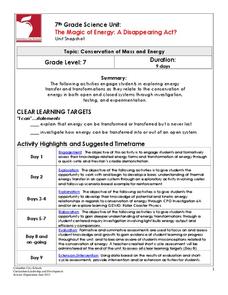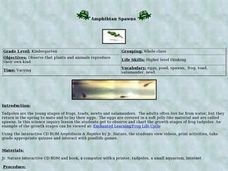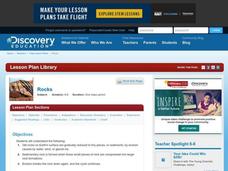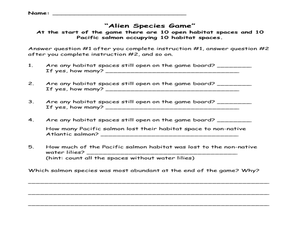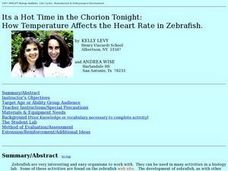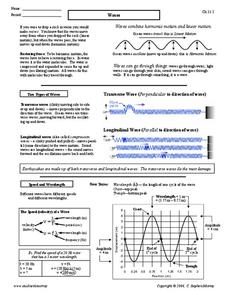Columbus City Schools
The Magic of Energy: A Disappearing Act?
Using the 5E method for teaching about kinetic energy, potential energy, and conservation of energy, this two-week unit with many videos and possible extensions is sure to keep pupils engaged as they are learning.
Curated OER
Volcanoes: Kindergarten Lesson Plans and Activities
In the pre-lab, kindergarteners mimic the movements of the eruption of a volcano and discover various volcanoes around the United States. Then, pupils sort different types of volcanic rocks in the lab before learning how volcanoes grow...
Tech Museum of Innovation
Seed Dispersal
Engineering challenges are not just man-made ... nature has its own set of them. A hands-on STEM activity has groups designing a seed dispersal system. Each group can only use one sheet of paper — a tough task!
Chicago Botanic Garden
Are Global CO2 Levels Changing?
According to the Mauna Loa observatory, carbon dioxide levels increased by 3 ppm in our atmosphere between 2015–2016. Individuals analyze carbon dioxide data from around the world and then share this with a home group in lesson three of...
Teach Engineering
Designing a Winning Guest Village in the Saguaro National Park
Don't desert a resource on the desert! Scholars work in groups to build on their ideas from the previous lesson to design a sustainable guest village in the Saguaro National Park. Each group produces a PowerPoint presentation to share...
Chicago Botanic Garden
Climate and Forest Ecosystem Services
Forests, through sequestration, capture excess carbon dioxide in our atmosphere and store it, aiding in climate change. The third installment in a four-part series on how climate impacts forests explores carbon sequestration. Classes...
Science Matters
Energy Flow
Budding scientists work collaboratively to reenact energy flow in a food chain. Scholars take on roles such as producer and consumer and perform tasks that symbolize energy flow in order to provide evidence of how much energy passes...
Science Matters
That’s An Otter Story
Young scientists discover how sea otters' habitats have changed due to human impact. Through conversation, video observation, and story reading, scholars identify how human interactions change a specific ecosystem in both positive and...
Serendip
Food, Energy and Body Weight
High schoolers learn why humans need calories, how they control weight with food choices, and the impact of exercise on energy. Scholars then apply their understanding to a case study of lunch choices and exercise.
Serendip
How Do Biological Organisms Use Energy?
When an organism eats, how does food become energy? Young biologists follow glucose through the process of cellular respiration to the creation of ADP using a discussion-based activity. The resource also highlights conservation of mass...
Serendip
Photosynthesis and Cellular Respiration
How does energy from the sun make plants grow? Scholars move step by step through the processes that promote plant propagation during a detailed lesson. The resource illustrates ADP production and hydrolysis, then allows learners to...
Curated OER
Ziplock Chemistry
Students investigate various chemical reactions when creating mixtures in ziplock baggies. In this chemistry lesson, students will recognize various chemical reactions and cite evidence. Safety and assessment strategies are included in...
Curated OER
Industrialization of the American Landscape
Students summarize the three sectors of industry and how these sectors applied to the Industrial Revolution. Students apply their skills in research and note-taking, as well as vocabulary building through web organizers. Students...
Curated OER
The Salt Water Connection
Students investigate the various factors that influence the Pacific Ocean and Monterey Bay, California. They watch a video about Monterey Bay and take notes, and conduct research and write a report about a specific organism living in...
Curated OER
Amphibian Spawns
Students observe tadpoles as they gradually change into adults. In this amphibian biology lesson, students watch tadpoles in a tank in the classroom, keep a daily record of what they observe, and chart the growth development of the...
Curated OER
Weather, Climate and Atmospheric Process
Students explore Earth science by completing a could identification activity. In this weather lesson, students discuss the different forms of measurement for the weather of Earth. Students discuss global warming and examine a list of...
Curated OER
Rocks
Students examine how sedimentary rocks are formed. In this rock activity students research different rock formations and different types of rock.
Curated OER
Teaching about the Effect of Photosynthesis and
Students demonstrate the effects of photosynthesis and respiration. They decide which variables to analyze in a microcosm study. They produce a written paper, oral presentation, poster, or multi-media presentation
Curated OER
Hermit Crabs
In this hermit crabs instructional activity, students utilize an article about hermit crabs and a dictionary to find the definitions to 11 vocabulary words and answer 9 questions about hermit crabs in complete sentences.
Curated OER
Salmon and the Non-Native Species
Students investigate the affect of non-native species on Pacific Salmon. For this non-native species and Pacific Salmon lesson, students participate in a competition and habitat loss game. They play the game in groups, while answering...
Curated OER
Temperature Affects The Heart Rate
Learners relate heart rate and development to environmental conditions through experiment. In cooperative groups, students record the heart rate in developing zebra fish. Groups create a standard curve to predict the temperature at...
Curated OER
Waves
In this waves worksheet, students read about the different types of waves and how the speed of waves is calculated. Then students complete 5 matching, 8 fill in the blank, and 9 short answer questions.
Curated OER
Waves
In this waves activity, students read about harmonic and linear motion in waves as well as the two types of waves. They match 5 terms to their definitions about the structure of waves, they solve for the wavelength, frequency and periods...
Curated OER
Drugged Out Daphnia
Young scholars make predictions and investigate (using a microscope) the effects of nicotine, caffeine, aspirin, alcohol, and sleeping pills on cultures of fresh water Daphnia.
Other popular searches
- Water Cycle Diagram
- The Water Cycle
- Water Cycle Experiment
- Water Cycle Activities
- Water Cycle Stages
- Water Cycle Crossword
- Water Cycle Lesson Plans
- Water Cycle Reader's Theater
- Water Cycle and Evaporation
- Water Cycle Diagram Label
- Water Cycle Simulation
- Build Your Own Water Cycle


